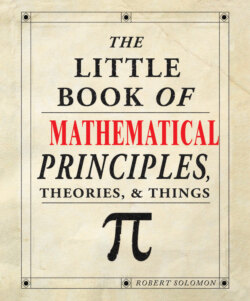Читать книгу The Little Book of Mathematical Principles, Theories & Things - Robert Solomon - Страница 29
На сайте Литреса книга снята с продажи.
3rd century BC Greece The Infinity of Prime Numbers Euclid (c. 325–265 BC)
ОглавлениеThe number of primes is infinite.
_______________
However many prime numbers are written down, there will always be another one.
A prime is a number which has exactly two divisors – 1 and itself. The first few prime numbers are 2, 3, 5, 7, 11, and 13.
This sequence goes on for ever. The proof is in Euclid’s Elements. His proof shows that there are more than three primes, but it can be extended to any number.
The proof goes by contradiction. Suppose that the only primes are a, b, and c. Then consider abc + 1. This is one greater than a multiple of a, and so it cannot be divisible by a. Similarly it cannot be divisible by b or c. By the fundamental theorem of arithmetic, any number can be written as a product of primes. This new number must be divisible by a prime which is different from a, b, and c, contradicting the assumption that these are the only primes.
This proof shows that there are infinitely many primes but it does not provide a formula for listing them. That formula was still to be discovered, over 2,000 years in the future.
See: Euclid’s Elements, page 35; The Fundamental Theorem of Arithmetic, page 39
